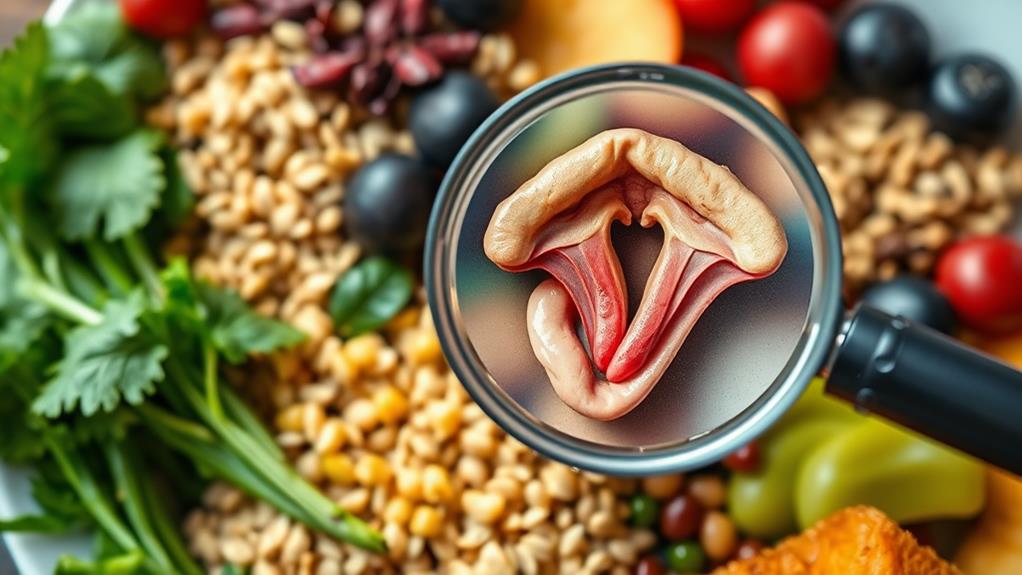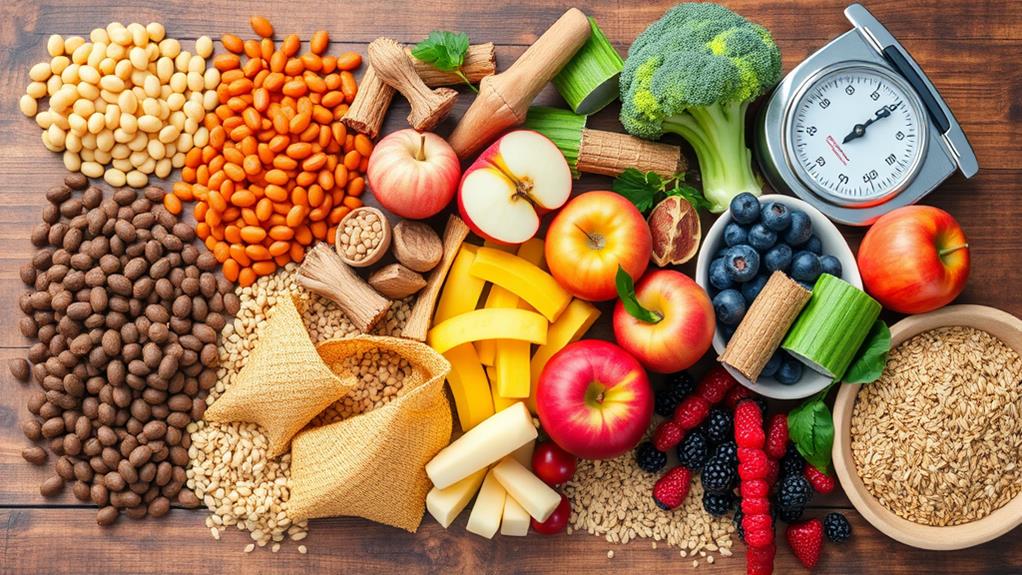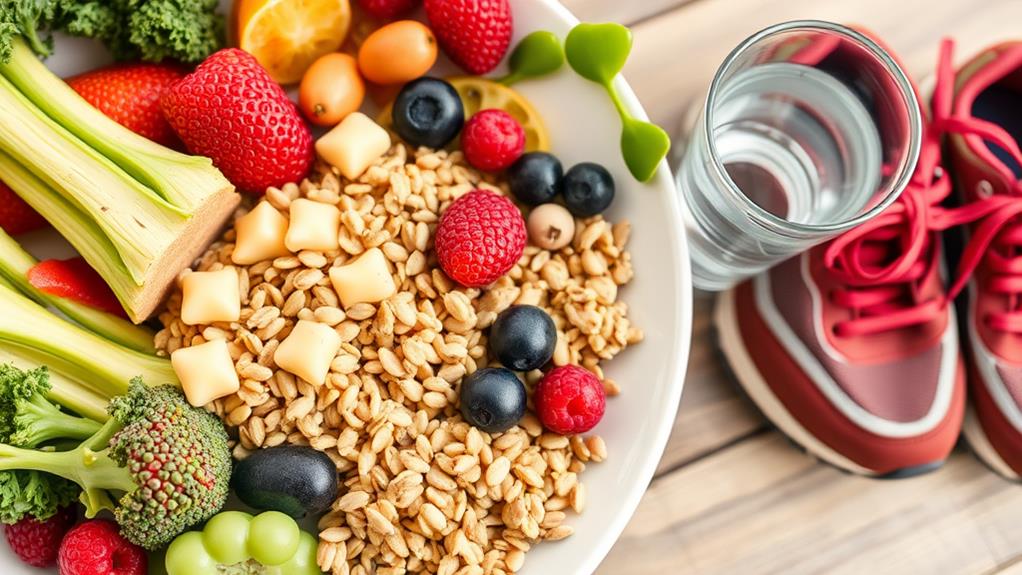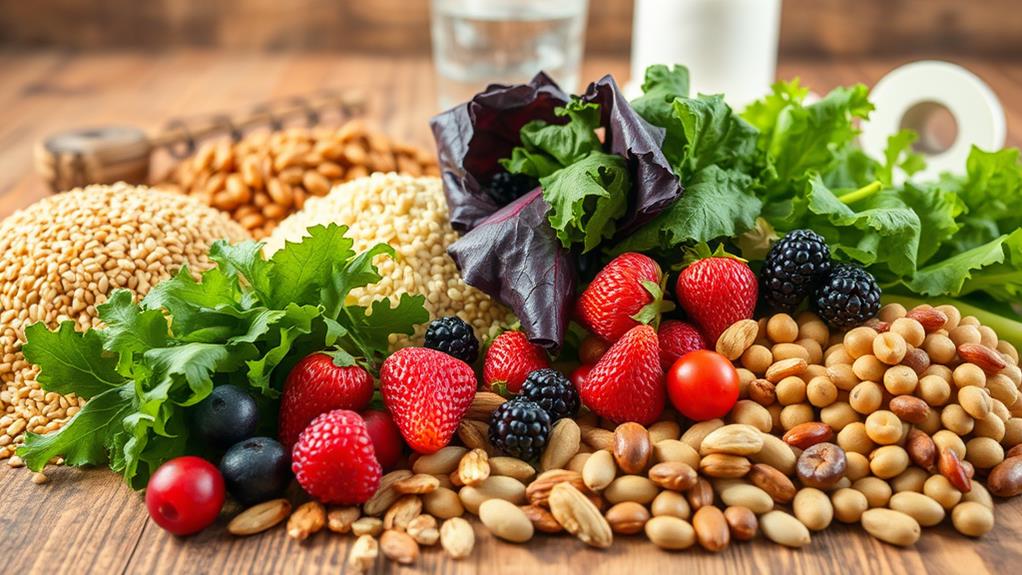As an Amazon Associate I earn from qualifying purchases.
Fiber plays a vital role in preventing hemorrhoids, with experts recommending 14 grams per 1,000 calories consumed daily. You should aim for 25-30 grams of fiber to promote digestive health and soften stools, reducing strain during bowel movements. Incorporate high-fiber foods like bran, fruits, vegetables, and legumes into your diet. Gradually increase your fiber intake to avoid bloating and drink plenty of water to help it work effectively. Fiber supplements can also help increase stool bulk and alleviate symptoms. By following these expert recommendations, you'll be taking a significant step towards preventing hemorrhoids and improving your overall digestive health. There's more to learn about managing hemorrhoid risk effectively.
Understanding Hemorrhoids

In the world of digestive health, hemorrhoids are a common but often misunderstood condition. They're fundamentally varicose veins located in your rectum or the end of your large bowel. These veins develop faulty check-valves, leading to sluggish blood circulation, inflammation, and distention. As a result, you may experience bleeding, itching, and pain.
You might be surprised to learn that your everyday habits can contribute to hemorrhoid development. Habitual straining or retaining stool, often due to constipation, is a common culprit. Obesity, pregnancy, and prolonged sitting or standing can also increase your risk. Even seemingly unrelated factors like heavy lifting and lack of hydration can play a role by increasing pressure on hemorrhoidal veins.
Hemorrhoids come in two types: internal and external. Internal hemorrhoids occur above the dentate line and are usually painless, while external hemorrhoids develop below it and can be quite painful, especially when thrombosed. While the exact prevalence is unknown, hemorrhoids are particularly common in Americans aged 45-65. Globally, about 4.4% of adults are affected. To prevent hemorrhoids, increasing your dietary fiber intake and staying hydrated can help alleviate constipation and reduce strain during bowel movements.
Importance of Dietary Fiber
You'll find that dietary fiber plays a vital role in preventing hemorrhoids and promoting overall digestive health. It's recommended that you consume 14 grams of fiber per 1,000 calories, which helps soften stools and ease their passage through your colon. By incorporating fiber-rich foods like high-fiber bran, raspberries, and pears into your diet, you'll not only reduce your risk of hemorrhoids but also improve your blood cholesterol and glucose levels.
Fiber's Digestive Benefits
Incorporating dietary fiber into your daily meals is essential for maintaining digestive health and preventing various ailments, including hemorrhoids. Fiber plays a pivotal role in promoting regular bowel movements and preventing constipation, which are key factors in reducing your risk of developing hemorrhoids. By aiming for the recommended 25-30 grams of fiber per day, you'll substantially improve your digestive health and overall well-being.
Fiber comes in two forms: soluble and insoluble. Soluble fiber, found in foods like beans, oats, and flaxseed, helps lower cholesterol levels and regulate blood sugar. Insoluble fiber, present in broccoli, carrots, and apples, aids in moving material through your digestive system and increases stool bulk. This combination helps prevent constipation and reduces strain during bowel movements, lowering your risk of hemorrhoids.
Unfortunately, the average American only consumes about 15 grams of fiber daily, falling short of the recommended intake. To reap the full digestive benefits of fiber, you'll need to consciously increase your consumption. By doing so, you'll not only reduce your risk of hemorrhoids but also lower your chances of developing heart disease, type 2 diabetes, and certain cancers.
Recommended Daily Intake
Understanding the recommended daily intake of fiber is key to preventing hemorrhoids and maintaining overall digestive health. The Dietary Guidelines for Americans, 2020-2025 recommends a dietary fiber intake of 14 grams per 1,000 calories consumed. This means that if you're on a 2,000-calorie diet, you should aim for 28 grams of fiber daily.
Unfortunately, the average American falls short of this goal, consuming only 15 grams of fiber per day. This deficit can contribute to the development of hemorrhoids and other digestive issues. To meet the recommended daily intake, you'll need to make conscious choices to increase your fiber content.
Recommended Daily Fiber Intake

You'll want to aim for 25-30 grams of fiber daily, as recommended by dietary guidelines. To meet this requirement, focus on consuming fiber-rich foods like bran, fruits, vegetables, and nuts. By reaching your daily fiber intake, you'll not only help prevent hemorrhoids but also promote regular bowel movements and reduce your risk of developing diverticulosis.
Fiber Intake Guidelines
To maintain a healthy digestive system and prevent hemorrhoids, having a sufficient amount of dietary fiber is vital. The Dietary Guidelines for Americans, 2020-2025 recommend 14 grams of fiber per 1,000 calories consumed. However, the average American only consumes about 15 grams of fiber daily, falling short of the recommended 25-30 grams for adults.
Increasing the fiber in your diet can offer numerous health benefits:
- Lower risk of heart disease
- Reduced risk of type 2 diabetes
- Decreased risk of certain cancers
- Improved digestive health and regular bowel movements
To meet the recommended fiber intake, you'll need to make dietary changes. Focus on incorporating a high-fiber diet rich in fruits, vegetables, whole grains, and legumes. Foods like broccoli, carrots, Brussels sprouts, apples, and kidney beans are excellent sources of fiber.
Meeting Daily Requirements
Meeting your daily fiber requirements is crucial for preventing hemorrhoids and maintaining overall digestive health. The Dietary Guidelines for Americans recommends consuming 14 grams of dietary fiber per 1,000 calories, which translates to about 25-30 grams for most adults. Unfortunately, the average American only consumes about 15 grams of fiber daily, falling short of this recommendation.
To increase your fiber intake and meet the daily requirements, focus on incorporating high-fiber foods into your diet. Choose whole grains over refined options, and aim to eat a variety of fruits and vegetables throughout the day. Legumes, such as beans, lentils, and peas, are excellent sources of dietary fiber and can easily be added to soups, salads, and main dishes.
Benefits of Sufficient Fiber
Sufficiency in fiber intake plays a crucial role in preventing hemorrhoids and maintaining overall digestive health. The Dietary Guidelines for Americans recommends 25-30 grams of fiber daily for adults, yet the average American only consumes 15 grams. This significant gap increases your risk of developing hemorrhoids and other digestive issues.
By meeting your daily fiber requirements, you'll experience numerous benefits:
- Softer, easier-to-pass stools
- Reduced pressure on rectal and anal veins
- Lower risk of hemorrhoid development
- Improved overall digestive health
Incorporating fiber-rich foods into your diet can help you reach the recommended intake. High-fiber bran, shredded wheat, pears, apples, and raspberries are excellent choices. These foods not only aid in hemorrhoid prevention but also offer additional health benefits.
A fiber-sufficient diet promotes regular bowel movements, lowers cholesterol levels, and helps control blood sugar. By increasing your fiber intake, you're not just preventing hemorrhoids; you're investing in your overall well-being. Remember, meeting your daily fiber requirements is a simple yet effective way to protect yourself from the discomfort and complications associated with hemorrhoids.
High-Fiber Foods for Prevention
Incorporating high-fiber foods into your diet is essential for preventing hemorrhoids. Focus on consuming a variety of fiber-rich foods that include both soluble and insoluble fiber. High-fiber bran is an excellent choice, with just 1/2 cup providing 14 grams of fiber, a significant portion of your daily needs.
Fruits and vegetables with tough skin, like apples, cucumbers, and celery, are rich in insoluble fiber, promoting regular bowel movements. Legumes, such as beans, lentils, and peas, offer soluble fiber, which helps lower cholesterol and improve blood sugar control. Don't forget to include nuts like almonds as a healthy, fiber-rich snack option.
| Food | Fiber Type | Benefits |
|---|---|---|
| High-fiber bran | Both | Softens stools, eases passage |
| Apples, pears | Insoluble | Promotes regularity |
| Legumes | Soluble | Lowers cholesterol, controls blood sugar |
| Nuts | Both | Healthy snack, adds variety |
Fiber Supplements and Hemorrhoids

While a balanced diet rich in natural fiber sources is ideal, some individuals may find it challenging to meet their daily fiber requirements through food alone. That's where fiber supplements can play a vital role in hemorrhoid prevention and management. These supplements offer several benefits:
- Increase stool bulk and softness
- Promote regular bowel movements
- Reduce inflammation and alleviate symptoms
- Lower cholesterol and improve blood sugar control
When choosing a fiber supplement for hemorrhoid prevention, look for products containing both soluble and insoluble fiber, as well as additional nutrients for digestive health. Psyllium, a popular soluble fiber supplement, can effectively lower cholesterol and improve blood sugar control while supporting hemorrhoid prevention.
To maximize the benefits of fiber supplements, aim for a daily intake of 25-30 grams of dietary fiber. Remember to take your supplements with plenty of water to avoid discomfort and guarantee proper absorption. By incorporating fiber supplements into your routine, you'll not only reduce your risk of hemorrhoids but also improve overall digestive health. Always consult with your healthcare provider before starting any new supplement regimen to confirm it's appropriate for your individual needs.
Implementing a Fiber-Rich Diet
Now that we've covered fiber supplements, let's focus on how to build a fiber-rich diet for hemorrhoid prevention. Eating foods high in fiber can make stools softer and easier to pass, treating and preventing hemorrhoids. The Dietary Guidelines for Americans recommends 14 grams of fiber per 1,000 calories consumed.
To implement a fiber-rich diet, incorporate foods like high-fiber bran, shredded wheat, pears, apples, and raspberries. Here's a quick reference table for fiber content:
| Food | Serving Size | Fiber (g) |
|---|---|---|
| High-fiber bran | 1/2 cup | 14.0 |
| Raspberries | 1 cup | 8.0 |
| Shredded wheat | 1 cup | 6.0 |
| Pear (with skin) | 1 medium | 5.5 |
| Apple (with skin) | 1 medium | 4.4 |
Remember to drink plenty of water and other liquids to help fiber work better. Introduce fiber gradually to avoid bloating and flatulence. You'll likely see benefits in about six weeks. Avoid foods with little or no fiber, such as cheese, chips, fast food, and ice cream, as they can worsen hemorrhoid symptoms. If you need help adding more high-fiber foods to your diet, consult a doctor or dietitian.
Additional Preventive Measures

Prevention extends beyond dietary choices when it comes to hemorrhoids. While a fiber-rich diet is vital, you'll need to address other risk factors to effectively reduce your chances of developing this uncomfortable condition. By incorporating these additional preventive measures into your daily routine, you can markedly lower your risk and potentially avoid the need for more invasive treatment of hemorrhoids.
- Stay hydrated: Drink plenty of water throughout the day to soften stools and prevent constipation.
- Exercise regularly: Physical activity promotes healthy bowel movements and improves circulation.
- Practice good toilet habits: Don't strain or sit on the toilet for extended periods, and avoid using harsh toilet paper.
- Maintain a healthy weight: Excess weight can put pressure on your rectal veins, increasing your risk of hemorrhoids.
Seeking Professional Medical Advice
When it comes to managing hemorrhoids effectively, seeking professional medical advice can make a significant difference. A medical professional, such as a doctor or dietitian, can create a personalized plan tailored to your specific needs. They'll help you incorporate more high-fiber foods into your diet, which is vital for treating and preventing hemorrhoids.
For reliable health information, you can turn to resources provided by the National Institute of Diabetes and Digestive and Kidney Diseases (NIDDK). They offer valuable guidance on eating, diet, and nutrition specifically for hemorrhoid management.
If you're looking for expert advice, consider consulting a gastroenterologist. These specialists in digestive health can provide in-depth knowledge on managing hemorrhoids and preventing complications. They'll guide you through lifestyle changes and recommend appropriate treatments, including high-fiber foods and supplements.
Frequently Asked Questions
What Is the Role of Fibre in the Prevention of Intestinal Disease?
You'll benefit from fiber's role in preventing intestinal diseases. It promotes fiber absorption, supports gut bacteria, and enhances colonic health. You'll experience improved digestion, reduced inflammation, and a lower risk of various digestive disorders by increasing your fiber intake.
Does Psyllium Husk Prevent Hemorrhoids?
An ounce of prevention is worth a pound of cure. You'll find psyllium husk can substantially reduce your hemorrhoid risk. This fiber supplement's benefits include softening stool and promoting regular bowel movements, making it an effective preventive measure.
How Does Fiber Help Prevent Constipation Reduce the Likelihood of Hemorrhoids and Relieve Diarrhea?
Fiber helps you prevent constipation and hemorrhoids by promoting gut motility and softening your stool. It absorbs water, adding bulk to your stool, making it easier to pass. For diarrhea, fiber's absorption slows down bowel movements.
How Does Metamucil Work for Hemorrhoids?
Metamucil works for hemorrhoids by providing fiber supplements that relieve symptoms. It softens your stool, making it easier to pass. Additionally, it supports your gut bacteria, promoting overall digestive health and reducing strain during bowel movements.
Conclusion
You've learned all about fiber's role in preventing hemorrhoids, yet ironically, you might still find yourself straining on the toilet. While you're armed with knowledge of high-fiber foods and supplements, it's amusing how often we overlook the simplest solutions. Don't forget, as you're meticulously planning your fiber intake, that staying hydrated and active are equally vital. Ultimately, your bottom line depends on more than just your dietary choices. When in doubt, consult a professional – they've seen it all before.
Amazon and the Amazon logo are trademarks of Amazon.com, Inc, or its affiliates.
